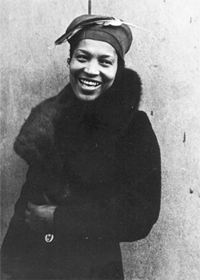Welcome
Zora Neale Hurston (1891–1960) was a star of the Harlem Renaisance and called "one of the greatest writers of our time" by Toni Morrison. Hurston was a distinguished author and anthropologist who celebrated and preserved her African–American culture in both her scientific research and in her fiction. She wrote four acclaimed novels—including her most famous novel, Their Eyes Were Watching God—two books of anthropology and folklore, one memoir, and numerous short stories, essays, and works of journalism.

Photograph by Carl Van Vechten, reproduced with permission of the Van Vechten Trust
When Hurston died in a welfare home in Fort Pierce, Florida, in 1960, her work had fallen into obscurity. Thirteen years later in 1973, Alice Walker discovered Hurston's unmarked grave and introduced Hurston's work to a new generation of readers and scholars. Since then, the Hurston revival has restored her position in American literature as a writer who movingly portrays an African–American culture that was on the verge of disappearing, gender relationships that feature women as equal to men, and characters who exhibit "racial health," in the words of Alice Walker.
All of Hurston's major works are in print. In addition, during the past several years the following three new posthumous works have been published: two volumes of folk tales and miscellaneous works—Every Tongue Got to Confess: Negro Folk–Tales from the Gulf States and Go Gator and Muddy the Water: Writings by Zora Neale Hurston from the Federal Writers' Project—and a collection of Hurston's letters, Zora Neale Hurston: A Life in Letters, edited by Carla Kaplan.
The purpose of the University of Central Florida Hurston Archive is to create an academic web site that will provide a repository of biographical, critical, and contextual materials related to Hurston's life and work. Our location a few miles from Hurston's hometown of Eatonville gives us unique access to people who knew Hurston and historical documents related to her work in Florida.
UCF's Zora Neale Hurston Institute for Documentary Studies is a related resource that explores "the theory and practice of forms of storytelling, cinematic expression, research and programs that encourage civic engagement and meaningfully address the work of excluded communities."


